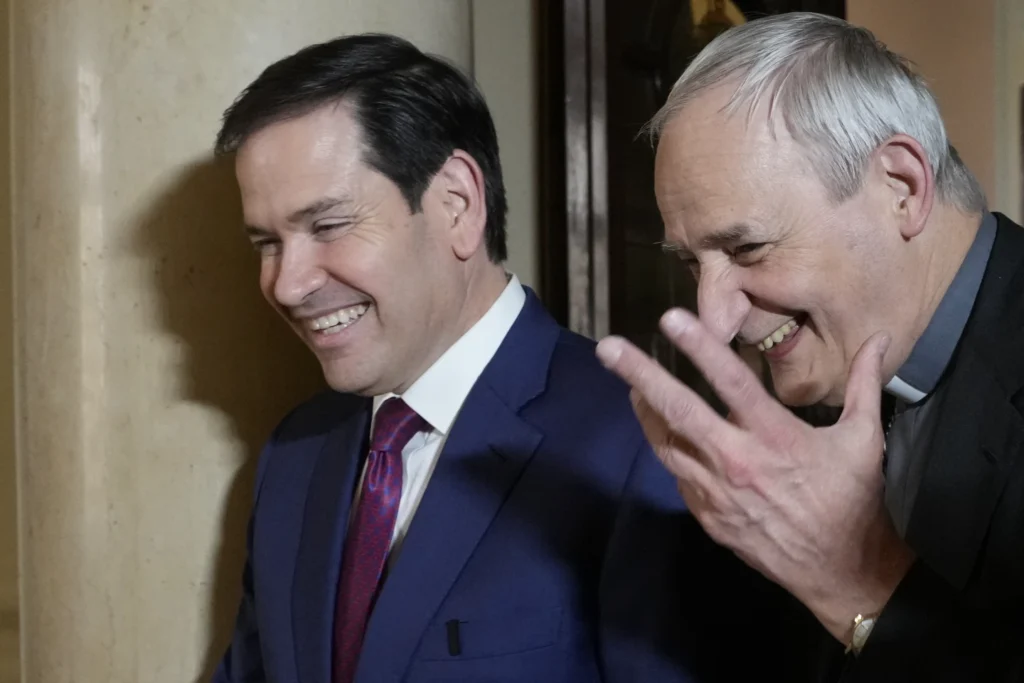ROME — U.S. Secretary of State Marco Rubio on Saturday suggested that the Vatican could host potential Russia-Ukraine peace talks, building on the Holy See’s long-standing offer to mediate and Pope Leo XIV’s renewed personal commitment to end the war.

Speaking to reporters in Rome ahead of a meeting with Cardinal Matteo Zuppi, the Vatican’s chief envoy for Ukraine, Rubio said discussions would center on how the Vatican could contribute to peace efforts and recent diplomatic developments.
Asked whether the Holy See could act as a broker, Rubio responded, “I wouldn’t call it broker, but it’s certainly — I think it’s a place that both sides would be comfortable going.”
Rubio added that he welcomed the Vatican’s “constructive and positive role,” praising its diplomatic neutrality and humanitarian initiatives. On Saturday, he also held meetings with Cardinal Pietro Parolin, the Vatican’s secretary of state, and Archbishop Paul Gallagher, the foreign minister.
The remarks followed Pope Leo XIV’s first Sunday address as pope, during which he vowed to make “every effort” to help bring peace to Ukraine. Speaking to members of the Eastern Catholic Church, including the Ukrainian Greek Catholic community, Leo called for an “authentic, just, and lasting peace,” and invited both parties to meet face to face under Vatican auspices.
“The Holy See is always ready to help bring enemies together, face to face, to talk to one another,” the pope said. “So that peoples everywhere may once more find hope and recover the dignity they deserve—the dignity of peace.”
Leo, elected on May 8 as the first American pope, previously described Russia’s invasion of Ukraine as an “imperialist war” during his time as a bishop in Peru. His election appears to have brought renewed energy to the Vatican’s stalled mediation efforts.
Cardinal Parolin reaffirmed the Vatican’s offer to host direct negotiations, noting the breakdown of talks in Istanbul earlier in the week.
“We had hoped it could start a process, slow but positive, toward a peaceful solution to the conflict,” Parolin said. “But instead, we’re back to the beginning.”
Asked to elaborate, Parolin clarified that the Vatican is offering a neutral venue and full discretion. “We have always said, repeated to the two sides that we are available to you, with all the discretion needed,” he said.
At the U.S. Embassy to the Holy See, Rubio thanked Zuppi for the Vatican’s role in securing prisoner exchanges and advocating for the return of Ukrainian children taken to Russia. State Department spokesperson Tammy Bruce confirmed that Rubio emphasized “the importance of continued collaboration under the new leadership of Pope Leo XIV.”
While previous Vatican efforts were largely limited to humanitarian channels, Leo’s statements suggest a broader ambition to revive peace talks and potentially bring both sides together under Vatican sponsorship.
The Vatican has a long record of diplomacy, with some notable successes. During the Cold War, Pope John XXIII made critical appeals for peace at the height of the Cuban missile crisis, urging U.S. President John F. Kennedy and Soviet Premier Nikita Khrushchev to step back from nuclear conflict.
Under Pope Francis, the Vatican brokered a 2014 thaw in U.S.-Cuba relations and hosted rival South Sudanese leaders in 2019 in a symbolic act of reconciliation, where Francis famously kissed their feet in a plea for peace.
Although Vatican diplomacy has had a limited role since Russia’s full-scale invasion of Ukraine in February 2022, the Holy See remains one of the few global actors accepted by both Kyiv and Moscow as a potential interlocutor.
Whether the latest offer will move the needle toward negotiations remains uncertain, but the Vatican’s renewed position as a neutral, moral actor could give it a unique edge in a geopolitical landscape short on trust.



